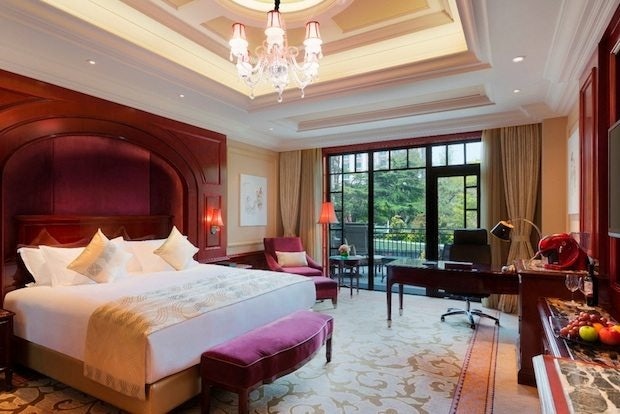
The InterContinental Shanghai Ruijin that opened in May 2013. (InterContinental Hotels Group)
Hotel chains from InterContinental to Starwood are on a tear developing hotels in China, but at this juncture Chinese domestic travelers far prefer Chinese brands over international brands.
That’s one of the results of a consumer survey of 3,500 Chinese travelers that’s part of a new report, PhoCusWright’s Traveler Reviews and Social Media in China, which was created in partnership with Brand Karma.
The survey of Chinese travelers—the majority of which travel domestically—found that 48 percent either only consider or prefer Chinese hotel brands while 28 percent put domestic and international brands on an equal footing when they are considering hotel stays. The survey also found that 20 percent of respondents indicated they don’t really think about whether they’d prefer an international or domestic hotel brand.
These findings have huge implications for international chains moving into China as they’ll either have to do a better job of marketing or localization to woo the growing ranks of Chinese domestic travelers.
The InterContinental Hotels Group, which has plans to open an additional 179 hotels in Greater China, including China, Hong Kong, Taiwan, and Macau, in the next couple of years has a solution: IHG plans to launch a new “Chinese” brand, Hualuxe, in China by the end of 2014.
The PhoCuswright study also includes a sentiment analysis of user reviews posted on Chinese travel sites and found that in the economy and midscale hotel sectors, Chinese brands in the aggregate scored much higher than international brands, although sentiment was basically when considering the hotel market overall.
International brands, including Aloft, Ascott, Courtyard, and Indigo were the top-scoring brands and their marks were “all really close,” says PhoCusWright’s Douglas Quinby, one of the authors of the study.
The lowest scoring brands were Chinese brands, including JingJiang, Ibis, and Starway, Quinby said.
Among other findings from the report:
- Chinese traveler reviews posted about the hotels sampled more than doubled in 2013 to 800,000.
- Some 88 percent of Chinese traveler reviews in 2013 were posted on online travel agency sites.
- Qunar, the hybrid metasearch and travel booking site, “is making up ground fast,” the report says, as its review volume jumped 419 percent and its review share in China reached 5 percent in 2013, up from 2 percent in 2012.
- Chinese travelers write more reviews about upscale properties than other tiers, but they are more content with their stays at budget hotels.
- The mobile revolution is impacting traveler reviews in China: Chinese travelers are increasingly apt to post reviews from mobile phones, and that has led to a decline in the number of words per review.
